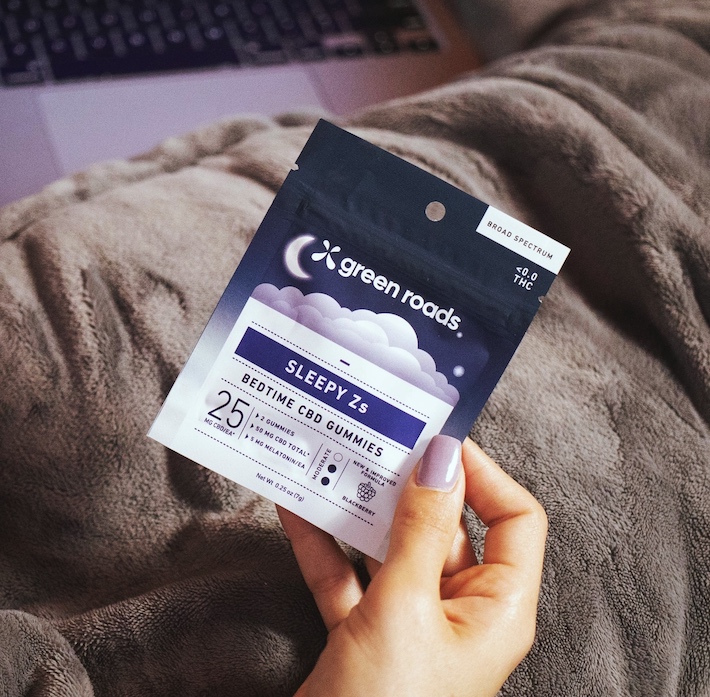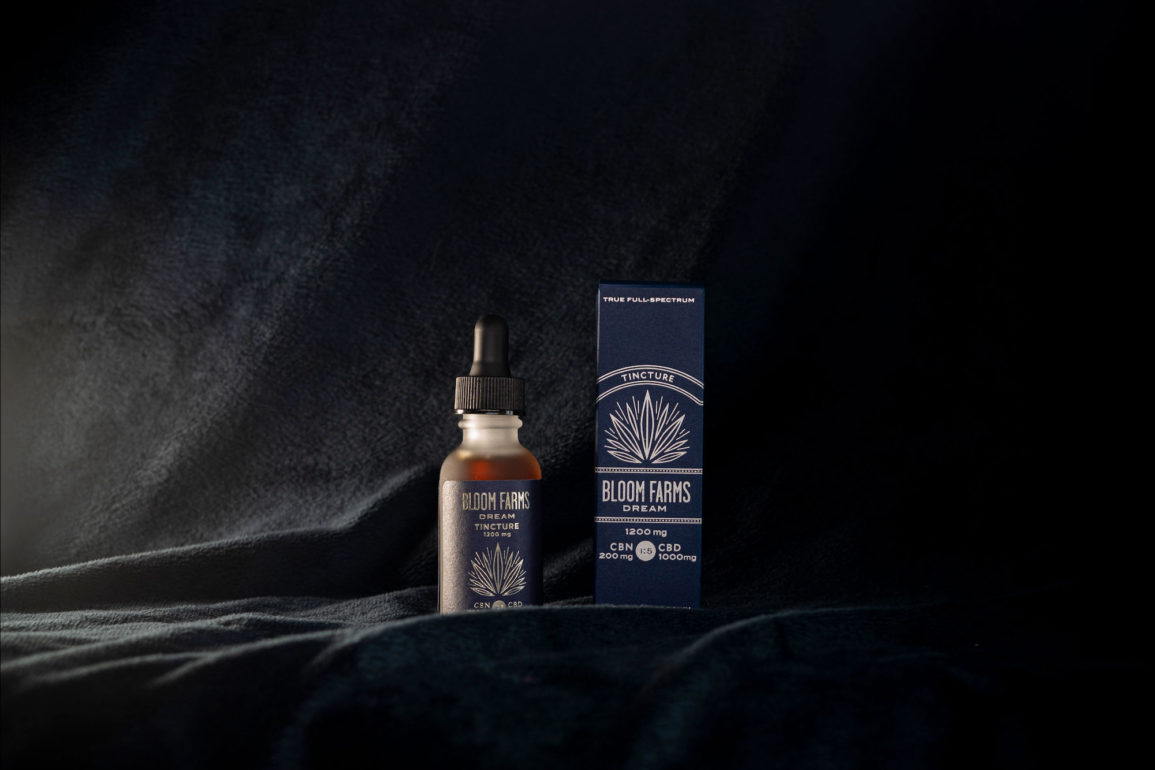We suspect you’ve already heard of melatonin before but never got round to finding out what it actually is.
Put simply, melatonin is a natural hormone found within your body. Produced by the pineal gland located deep within the center of your brain and responds to light and dark. It naturally regulates your circadian rhythm, controls your sleep-wake cycle, and improves overall quality of sleep.
As the sun begins to set, melatonin levels rise, preparing your mind and body for sleep. As the sun rises, melatonin levels decrease, helping you wake up in the morning. Honestly? It’s like a werewolf in hormone form. Out at night. Hidden during the day.
Sometimes your melatonin levels can fluctuate for a variety of reasons, causing unwanted symptoms. Synthetic melatonin supplements are useful. Many CBD brands are placing melatonin supplementation into their own products for enhanced sleep benefits, even though neither CBD nor melatonin is approved by the FDA.
So, how safe are they? Should you be cautious about combining CBD and melatonin? What does the FDA say about all this?
What you need to know:
- CBD + Melatonin is a common and effective holistic option to help with insomnia and sleep-aid.
- 50-70 million people suffer from sleep problems and melatonin sales increased by over 46% in 2020, making it the number one selling sleep-aid.
- Melatonin supplements are manufactured to not only improve your sleep but also reduce mood disorder symptoms and stomach acid secretions, as well as increase bone strength and muscle mass.
- Melatonin in CBD is safe, neither causes adverse health risks to you or anyone else, nor have they killed anyone — so why are they not FDA-approved?
- The FDA is contradictory, has approved harmful and addictive drugs, and influenced by big pharma — 75% of opioid approval is controlled by pharma companies.
Man-made synthetic melatonin is available in the US and commonly used in your CBD
Synthetic melatonin supplements are widely used in the United States.
An estimated 50-70 million people have problems with sleep or suffer from a diagnosed sleep disorder. Business Insider reported melatonin sales increased by over 46% in 2020, presumably due to the pandemic.
It’s currently the number 1 selling sleep-aid. Available over-the-counter in pill, capsule, or gummy form without a prescription.
Because natural human-derived melatonin is practically impossible and animal-derived melatonin risks viral transmission to humans, manufacturers have created a safer alternative in the form of synthetic melatonin supplementation.
What exactly is synthetic melatonin?
Synthetic melatonin supplements are made from pharmaceutical-grade ingredients with similar molecular structures to your own body’s melatonin. Sometimes combined with 5-methoxytryptamine (5-HTP), a naturally-occurring compound sourced from the seeds of an African plant named Griffonia simplicifolia. 5-HTP produces more serotonin (the happy molecule), which then converts into melatonin.
How does synthetic melatonin work inside your body and how can it help you?
When consumed, melatonin supplements boost serotonin levels during the day and melatonin levels during the night, which helps improve your circadian rhythm, quality of sleep, and sleep-wake cycle.
Studies show melatonin supplementation could help you with the following:
- Improved sleep in people with insomnia, the blind, those who experience jet lag, and those with developmental disorders
- Reduced mood disorder symptoms
- Increased bone strength + muscle mass
- Decreases stomach acid secretion
Internal and external factors can negatively affect your melatonin production, such as:
- Environments with limited sunlight (think Northern Hemisphere countries)
- Drug intake — beta-blockers (atenolol and propranolol), non-steroidal anti-inflammatory drugs (NSAIDs)
- Exposure to blue light (nighttime)
- Natural aging process
- Stress, anxiety, and depression
- Certain diseases and conditions — dementia, cancer, type 2 diabetes, chronic pain
- Caffeine intake
A reduction in melatonin production is known as melatonin dysfunction. One of the most common symptoms of melatonin dysfunction is sleep disturbances, which can lead to short or long-term insomnia, anxiety, and depression due to an overall lack of quality sleep.
In these cases, a helping hand can go a long way. Synthetic melatonin supplements are commonly used to boost melatonin production and, by extension, improve sleep.
Is melatonin safe when combined with CBD?
Melatonin is considered safe to use in the short-term, but the lack of regulatory oversight from the FDA has caused a lot of confusion over how safe it is in the long-term.

The same goes for CBD. Studies on CBD’s long-term effects are limited and the FDA has failed to provide enough regulatory oversight.
Health risks and side-effects associated with melatonin
Melatonin’s health risks and side-effects are typically short-term and pose no immediate health problems, especially in healthy individuals with no pre-existing conditions. There have been no cases of melatonin deaths caused by overdose, nor is there any evidence to suggest it’s addictive.
Melatonin health risks and side-effects include:
- Dizziness
- Nausea
- Headaches
- Drowsiness and fatigue
Health risks and side-effects associated with CBD
Similar to melatonin, CBD’s health risks and side-effects are temporary, non-life-threatening, and pose no immediate adverse risk to the user. There are no recorded cases of CBD death via overdose, nor is there anything to suggest it causes addiction.
CBD health risks and side-effects include:
- Dizziness
- Headaches
- Drowsiness
- Fatigue
- Appetite reduction
- Nausea (rare)
- Fatigue
Does melatonin interact negatively with CBD (or vice versa)?
There are currently no known negative effects of melatonin and CBD combined. Both are naturally-occurring compounds present in the body.
Many who consume CBD often become worried when they combine it with certain medications or substances. This is a very real concern. There are substances and medications that do interact negatively with CBD (and vice versa) and it’s something we should all be conscious of.
However, melatonin isn’t one of them. It doesn’t occupy the same space during the metabolization process.
So, do melatonin and CBD complement each other?
Yes. We believe so. Both melatonin and CBD interact with different receptors. Melatonin interacts with MT1 and MT2 receptors, while CBD interacts indirectly with your endocannabinoid system via vanilloid (TRPV1) and serotonin (5-HT) receptors.
Though different, all four of these receptor types belong to a group known as GPCR (G protein-coupled receptors). They not only have the ability to regulate sleep but also anxiety, pain, and inflammation. When activated together, they’re quite a powerful foursome.
CBD and melatonin aren’t FDA-approved (but opioids and other harmful drugs are)
Despite being well-tolerated and generally very safe to consume, the FDA hasn’t approved CBD or melatonin, though melatonin is placed under the Dietary Health & Regulation Act as a supplement similar to vitamins and minerals. This means both are largely unregulated.
What is FDA-approval?
One of the most common misconceptions surrounding FDA-approved drugs is they cause no harm or side-effects. This isn’t true. The purpose of FDA approval is to make sure all drugs do what they say they do and the side-effects are correctly analyzed and evaluated via clinical trials before being going to market.
This approval process is long and arduous. Very strict and selective. Companies and manufacturers must jump through loop after loop before being approved — and that’s under the assumption approval will even happen.
The FDA-approval system is a five-step process:
- Discovery, concept, development
- Preclinical Research
- Clinical Research
- FDA Review
- FDA Post-Marketing Safety Monitoring
This process takes anywhere between a week to eight months, and it’s very expensive and time-consuming. Preclinical and clinical research, alone, can cost millions of dollars. The entire process can cost upwards of $1 billion.
Why are CBD and melatonin not approved?
This, right here, is the million-dollar question.
Neither cannabidiol nor melatonin are prohibited substances. They’re both largely unregulated by the FDA but still sold over-the-counter. However, they must comply with FDA regulations insofar as manufacturing, production, distribution, purity, safety, and marketing (no health claims).
In the case of CBD, the FDA is concerned with “a lack of appropriate processing controls and practices” that put consumers at risk, as well as long-term consumption risks, how it affects developing brains, and if it produces toxicity.
In the case of melatonin, it’s loosely-regulated but evidence of its safety isn’t sufficient enough to be approved as a medicine.
To be honest, this is bullshit when you consider other, more harmful FDA-approved drugs are peddled out week-in-and-week-out.
The FDA’s contradictory approval system
The problem with using the FDA as a beacon of drug safety is the entire agency is contradictory in what it approves and what it doesn’t. There are a number of questionable pharma-based inclusions on the list of FDA-approved drugs, many of which are far riskier than natural compounds such as CBD and melatonin.
Prescription opioids, for example, are some of the biggest killers in the US. 46,000 people died from opioid overdose in 2018. This almost doubled in 2020. Despite their dangers, the FDA continues to allow mass-prescription and consumption all across the US.
CBD and melatonin, on the other hand, never killed anyone, nor are they open to abuse. CBD is not a psychotropic substance. It does not impair judgment, thinking, or cognitive ability. Melatonin is technically a psychotropic substance, as it “controls” sleeping behavior, but isn’t addictive (unlike other prescription sleep aids).
In other words, neither are adversely harmful, so why not approve them?
Perhaps it doesn’t make sense on the FDA’s side to do this, but we suspect money, pharma pressure, and a hint of greed are primarily involved.
You see, pharmaceutical companies have a lot of power. The FDA is well-aware of this. More than 75% of opioid FDA drug approvals are reportedly controlled by big pharma. Americans spent more than $535 million on prescription medication in 2018. Prices are set to increase as we push further in 2021.
Money is power, obviously. But at the cost of public health and safety?
What to look out for when purchasing CBD products
Despite being one of nature’s greatest inventions, the unregulated nature of CBD still poses many pitfalls for consumers.
If you’re a beginner and you have no idea which CBD product to buy (with or without melatonin), you’re a prime target for shady companies selling equally shady products.
It’s always useful to be aware of what you’re purchasing. Knowing you’re buying from a reputable brand is a good place to start.
It’s, therefore, worth doing your research before even pressing the “buy” button. See if the company has ever been busted for mislabeling its products in the past, check where the company sources its hemp, look for a proper ingredients list, and always make sure publicly available COAs are posted onto the website.
